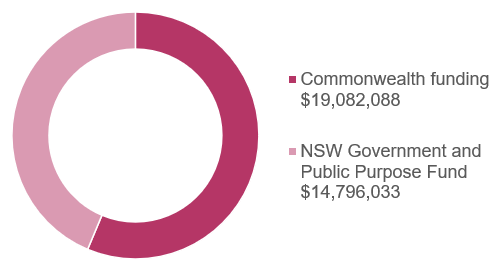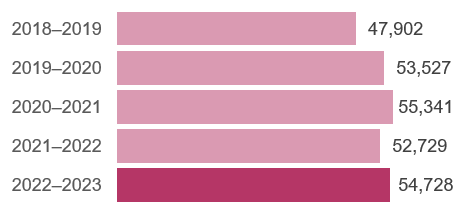Community legal centres
Legal Aid NSW administers funding on behalf of the NSW Government, Commonwealth Government and Public Purpose Fund for the Community Legal Centres (CLC) Program in NSW.
The CLC Program funds 32 centres, including generalist and specialist community legal centres and the state peak body Community Legal Centres NSW (CLCNSW). The CLC Program also funds the Aboriginal Legal Access Program, the Children’s Court Assistance Scheme and the Court Support Scheme, which provide complementary non-legal support services in courts and local communities.
CLCs are independent, non-government organisations that provide free legal services to the public, focusing on people facing social and financial disadvantage. In addition to funding available through the CLC Program, centres may also receive funding from various other government and non-government sources.
Funding and services
This year, we administered $33,878,121 of CLC Program grant funding to community legal centres and CLCNSW. The CLC Program also administered some one-off Commonwealth and state funding for disaster-related legal assistance and sector-wide projects. For further details regarding this funding, see Appendix 4.

- Commonwealth funding: $19,082,088
- NSW Government and Public Purpose Fund: $14,796,033.
-
Fact file
In 2022–23, community legal centres used this funding to assist 35,025 people and provide a range of legal assistance services, including:
- 40,215 instances of legal advice
- 10,209 legal tasks
- 3,784 representation services including 1,181 court and tribunal services
- 1,043 community legal education activities
- 351 community legal education resources.
In 2022, the NSW Government allocated $4.6 million to 22 CLCs to increase their capacity to support victim-survivors of domestic, family and sexual violence. The funding was for CLCs to deliver up to two years of additional frontline services. It enabled the sector to employ more lawyers and specialist workers to provide wrap-around legal assistance services and non-legal support, such as counselling.
The services complemented the work CLCs already do to assist vulnerable people experiencing or at risk of family violence across NSW. These clients are a national priority group, and many CLCs receive targeted funding to provide them with legal assistance and deliver family law or family violence-related services.
In 2022, the federal government committed an additional $7 million to NSW CLCs to support relief and recovery in communities impacted by the 2019–20 bushfires and 2022 floods.
The funding was allocated to seven CLCs in NSW for service delivery over four years up to 30 June 2026. The recipients included generalist regional CLCs in impacted areas and statewide CLCs specialising in tenancy and social security legal assistance.
Over the next four years, the CLCs will hire more staff and conduct additional outreach services to continue to support individuals and communities affected by natural disasters.
In 2021–22, the CLC sector received $200,000 of Australian Government funding to pilot a First Nations Cadetship Program. In its first year, four Aboriginal or Torres Strait Islander university students took the opportunity to undertake practical learning and work experience in their field of study and were employed at participating CLCs.
In January 2023, the former NSW Attorney General awarded the First Nations Cadetship Program a further $640,000 in Commonwealth funding to expand over the next three years. The additional funding will allow the Cadetship Program to employ another 12 cadets and a part-time cadetship coordinator.
The cadetship program provides the opportunity for First Nations cadets to gain experience at generalist and specialist CLCs located across NSW. The program aims to contribute to career development and encourage an increase in First Nations employment across the sector.
In 2022, some streams of CLC Program funding were redistributed through an application process. The former NSW Attorney General appointed an independent panel to assess applications against criteria and make recommendations to guide funding decisions.
The former Attorney General accepted the panel’s recommendations. Funding allocated to the CLC Program from 1 January 2023 to 30 June 2025 included $4 million per annum of Commonwealth funding for family law and family violence-related services and $2.2 million per annum of NSW Government funding for projects addressing identified critical service gaps in community legal services. These included projects focusing on older people, vulnerable women, employment law, a health justice partnership and northern and western NSW.
The year ahead
- We will work with CLCNSW to conduct the sector-wide CLC client satisfaction survey.
- We will continue to administer funding to CLCs providing services to people most in need, including services dedicated to people impacted by floods and natural disasters, domestic, family and sexual violence and critical service gaps.
- The CLC sector will participate in the Australia-wide review of the National Legal Assistance Partnership in early 2024.
- As centres transition to new case management systems, we will continue to work with CLCNSW and CLCs Australia to improve data collection and reporting.
Women’s Domestic Violence Court Advocacy Program
Legal Aid NSW administers NSW Government funding for Women’s Domestic Violence Court Advocacy Services (WDVCASs) across the state through our Women’s Domestic Violence Court Advocacy Program (WDVCAP) Unit.
WDVCASs provide women experiencing domestic and family violence and their children with information, advocacy, safety planning, referrals, case management and support through the court process at all local courts across NSW.
WDVCASs play a key role in the NSW Government’s Safer Pathway Program, including providing secretariat and victim liaison support for Safety Action Meetings (SAMs) across the state. SAMs are local interagency meetings that assist victims at serious threat of injury or death due to domestic and family violence.
We also administer the social support services component of the FASS, a national scheme of integrated legal and social support for families affected by domestic and family violence. WDVCASs provide social support for women, and Relationships Australia NSW provides social support for men. In 2022–23, FASS social support workers assisted 3,346 clients.
-
Fact file
- 15.7% increase in the number of service events provided to clients in 2022–23 compared to the previous year.
- 15.6% of WDVCAS clients identified as Aboriginal or Torres Strait Islander.
- 20% of WDVCAS clients identified as being from a culturally diverse background.
- 10.3% of WDVCAS clients identified as having a disability.
Number of women supported by Women's Domestic Violence Court Advocacy services

In April 2023, the NSW Government announced a $6.1 million investment to expand the WDVCAS Hearing Support Pilot.
Pilot funding has enabled participating WDVCASs to employ dedicated hearing support specialist workers to assist women in preparing for a court hearing and attending court safely. This support can include arranging for women to attend a pre-hearing clinic with police, helping them to understand the court process, facilitating access to remote witness facilities or arranging supports on the day, such as transport and childcare.
The pilot aims to reduce the stress and trauma associated with the court process. The pilot started in November 2022 in 14 WDVCAS locations, covering 73 local courts.
The additional $6.1 million announced in April 2023 will enable the pilot to expand to all WDVCAS locations for one year from November 2023. Results will then be evaluated by the University of Technology, Sydney.
In October 2022, the WDVCAP Unit successfully launched a co-location pilot with NSW Police in five police stations across the state. Under the pilot, a specialist domestic and family violence support worker from WDVCAS is based at a participating police station from Monday to Friday to provide support to women who visit the station to report or seek help with domestic and family violence.
The pilot aims to improve the response to women experiencing domestic and family violence who attend a police station. Providing a specialist, trauma-informed worker at the station may help reduce the fear women often feel when asked to share their story at the front counter and encourage more women to seek police assistance and engage with available supports.
Following positive feedback from pilot sites at Fairfield, Hurstville, Armidale, Griffith and Nowra, the NSW Government announced a further $1.4 million investment in April 2023 to expand the pilot to five extra locations from October 2023.
In partnership with the Legal Aid NSW Domestic Violence Unit and Early Intervention Unit, the WDVCAP Unit helped to expand the FASS to all FCFCOA registries across NSW in 2022–23. This expansion was made possible by increased funding from the Australian Government.
Women and men impacted by domestic and family violence going through the family law process can now access integrated legal and social support through the FASS anywhere in NSW, no matter which court they attend.
The year ahead
- We will launch a single, streamlined online client and case management system for WDVCASs and FASS social support services. This system will replace multiple existing systems and processes and is expected to reduce time spent on administration and data entry tasks by 50 to 80 per cent.
- We will undertake a procurement and contracting process for WDVCASs from 1 July 2024 onwards.
Key challenge
- In 2023–24, we will need to manage multiple large-scale, high-priority projects simultaneously. We will launch our new client and case management system, complete a statewide procurement and contracting process, and expand the hearing support and police co-location pilots.
Share with
Facebook
Twitter
LinkedIn